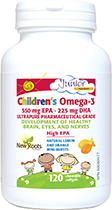Fish Oil for Kids
Fish-derived omega-3 fatty acids have been shown to play a number of important roles in kids’ health, not the least of which include mood-enhancing effects, improvements in behaviour disorders such as ADHD, and anti-inflammatory effects.
Omega-3 fatty acids are critically important natural agents for supporting healthy cognitive function and development. Evidence shows that the marine-derived omega-3 fatty acid eicosapentaenoic acid (EPA) in particular influences mood and cognition.[1] Studies have shown that EPA-rich omega-3 supplements can reduce ADHD traits, and even reverse criteria for the diagnosis of ADHD in a considerable percentage of children.[2] A 2011 systematic review and meta-analysis included data from 10 trials of 660 children.[1] Collectively, the data showed that there was a significant difference with omega-3 fatty acid treatment, and that higher doses of EPA within the omega-3 fatty acids supplements were significantly associated with increased efficacy in treating ADHD symptoms.[1] Studies show that the dose of EPA for children should be a minimum of 400 mg EPA per day.
Secondly, EPA has been shown to regulate mood in children. A number of studies have examined its use in children with depression or bipolar disorder.[3][4][5] One study assessing fish oil among depressed children ages six to twelve years found that use of fish oil resulted in “highly significant”[3] benefit on depression-rating scales including the Children’s Depression Rating Scale (CDRS), Children’s Depression Inventory (CDI), and Clinical Global Impression (CGI), when compared to placebo.[3] In another study, among adolescents with borderline personality disorder and at high risk for psychosis, supplementation with fish oil was found to significantly improve functioning and reduce psychiatric symptoms, compared with placebo.[4] Finally, among children ages 5 to 12 years with pediatric bipolar disorder, use of high-EPA fish oil plus inositol resulted in significantly reduced symptoms of mania and depression, compared with placebo.[5]
Finally, EPA is thought to act as a strong anti-inflammatory agent within the brain. In the cell membrane, EPA competes with arachidonic acid for enzyme conversion to specific cytokines. Arachidonic acid is converted to proinflammatory chemicals such as prostaglandin E2 (PGE2), while EPA is converted to anti-inflammatory chemicals such as PGE3. When enzymes such as cyclooxygenase-2 (COX-2) come along, they find EPA instead of arachidonic acid, thereby there are more anti-inflammatory chemicals created. EPA may also help modulate signal transmission between brain cells. EPA is such a powerful anti-inflammatory that it has been shown to benefit several chronic conditions characterized by inflammation, including asthma and conditions such as juvenile arthritis.[6][7]
Parents ought to be made aware that the effect of EPA on mood, behaviour, and cognition may take up to 12 weeks to take effect. Although September may be far from most parents’ minds, preparation with nutritional supplements ought to be started well in advance of the school year.
References
- Bloch, M.H., and A. Qawasmi. “Omega-3 fatty acid supplementation for the treatment of children with attention-deficit/hyperactivity disorder symptomatology: Systematic review and meta-analysis.” Journal of the American Academy of Child and Adolescent Psychiatry, Vol. 50, No. 10 (2011): 991–1000.
- Sinn, N., and J. Bryan. “Effect of supplementation with polyunsaturated fatty acids and micronutrients on learning and behavior problems associated with child ADHD.” Journal of Developmental and Behavioral Pedicatrics, Vol. 28, No. 2 (2007): 82–91.
- Nemets, H., B. Nemets, A. Apter, Z. Bracha, and R.H. Belmaker. “Omega-3 treatment of childhood depression: A controlled, double-blind pilot study.” The American Journal of Psychiatry, Vol. 163, No. 6 (2006): 1098–1100.
- Amminger, G.P., A.M. Chanen, S. Ohmann, C.M. Klier, N. Mossaheb, A. Bechdolf, B. Nelson, et al. “Omega-3 fatty acid supplementation in adolescents with borderline personality disorder and ultra-high risk criteria for psychosis: A post hoc subgroup analysis of a double-blind, randomized controlled trial.” Canadian Journal of Psychiatry, Vol. 58, No. 7 (2013): 402–408.
- Wozniak, J., S.V. Faraone, J. Chan, L. Tarko, M. Hernandez, J. Davis, K.Y. Woodworth, and J. Biederman. “A randomized clinical trial of high eicosapentaenoic acid omega-3 fatty acids and inositol as monotherapy and in combination in the treatment of pediatric bipolar spectrum disorders: A pilot study.” The Journal of Clinical Psychiatry, Vol. 76, No. 11 (2015): 1548–1555. Correction in The Journal of Clinical Psychiatry, Vol. 77, No. 9 (2016): e1153.
- Nagakura, T., S. Matsuda, K. Shichijyo, H. Sugimoto, and K. Hata. “Dietary supplementation with fish oil rich in omega-3 polyunsaturated fatty acids in children with bronchial asthma.” The European Respiratory Journal, Vol. 16, No. 5 (2000): 861–865.
- Alpigiani, M.G., G. Ravera, C. Buzzanca, R. Devescovi, P. Fiore, and A. Iester. “[The use of n–3 fatty acids in chronic juvenile arthritis].” La Pediatria Medica e Chirurgica, Vol. 18, No. 4 (1996): 387–390 [Article in Italian].

 Stores
Stores
